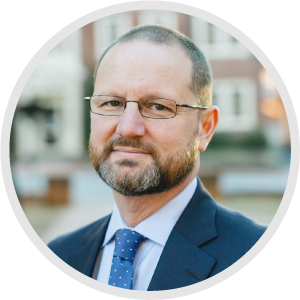Joe Platania, who serves as chief prosecutor in the college town of Charlottesville, Virginia, has some advice for people who go into his line of work: If you don't wake up every day terrified by the power that you possess as a prosecutor, you should do something else.
For the past 20 years—first as a staff lawyer, and since 2017 as Charlottesville's popularly elected Commonwealth's Attorney—Platania has been dispensing justice in the hometown of the University of Virginia. And every day, Platania walks a tightrope.
First and foremost, Platania's job is to protect the public. He and his staff of five lawyers work to convict people who have committed crimes and, when the crimes are serious, advocate for prison sentences.
Platania must decide whether or not to charge a person for a crime and which charges to pursue. For example, what if someone commits a crime because they have a substance use or behavioral health problem? Is incarceration the right approach? Why or why not? And how do you know?
These individual decisions, which Platania and his staff make routinely, are usually described with the dry phrase, “prosecutorial discretion.” But every decision can profoundly change the course of a life—or many lives. And that power is what keeps Platania awake at night.
"There is a tremendous amount of power vested in the prosecutor,” Platania recently told Karen Friedman, host of the Justice Today podcast. “That comes from charging decisions and plea agreements—how cases are charged and resolved… It's just a tremendous amount of power to be vested in one, and only one, player in the system."
Platania advises his staff attorneys and other prosecutors to use their power with thoughtful intention. He has several rules. Approach each case with humility. Everyone, including prosecutors, makes mistakes. And every defendant’s life will be changed by the judgment calls that prosecutors make.
“It’s really not the job of a prosecutor to convict people. Our job is to balance community safety with the fair treatment of someone charged with a crime. If that is the culture that you have as a prosecutor, you're going to get it right most of the time.” — Joe Platania
Platania has a unique perspective that he brings to his role as prosecutor. He started his career in law as a public defender, representing death-row prisoners.
“I really enjoyed the work,” Platania said. “I found it very meaningful, and really cared a great deal for my clients. But after doing it for almost five years, I saw that within the system, the prosecutors really had all of the power. That's really what brought me into the work of being a prosecutor.”
Platania does have one thing in common with many of his fellow prosecutors: He believes most of the cases his office handles involve defendants suffering from substance use disorders. “Maybe as many as three quarters of our cases involve some issues surrounding substance use disorder or behavioral health issues,” he said.
Platania has not found easy answers to this problem. “Believe me, when someone's not ready, there's not anything that anyone can do to make them stop using,” he said. “No prosecutor, no judge, no defense attorney, no clinician. It's not going to work. You have to understand going into the work involving substance use disorder that sometimes it takes a while. Years and decades, for some folks.”
Platania says that exercising prosecutorial discretion—balancing public safety with the circumstances of an individual defendant—is never easy and never certain. “You never fully master prosecutorial discretion,” he said. “I make several mistakes every single day. It's more of an art than a science.”
“Every decision in every case should be treated on an individual basis,” Platania explained. “You should have input from the harmed party or victim about what they'd like to see happen. They should have agency and a voice. You should consider the person that's committed a crime, their life circumstances. What do they need? What can keep them from reoffending?”
Despite the challenges of being a prosecutor, Platania says he cannot imagine a more rewarding career. “The people that we deal with in the criminal justice system, their lives have so much pain and tragedy and trauma,” he said. “And then there's so much hope and joy and happiness. It's just this big mash of human emotions. And, boy, what a privilege to have a front row seat, to be working in this field. I just absolutely love it.”
To learn more, listen to the corresponding Justice Today podcast episode:


